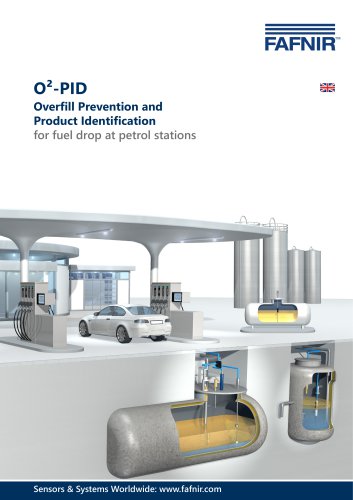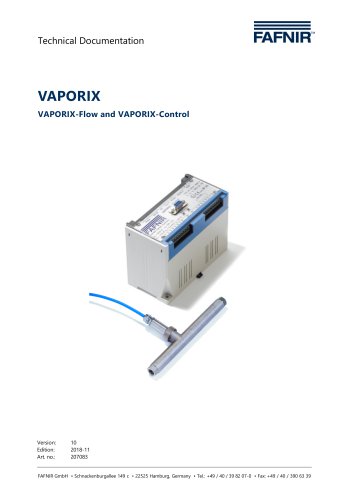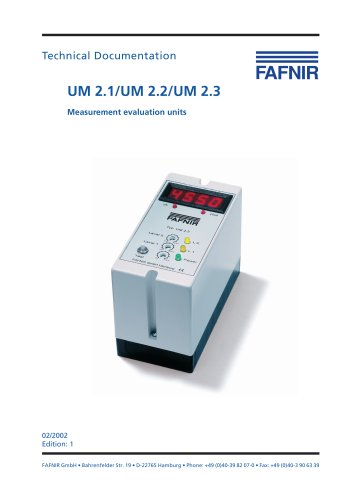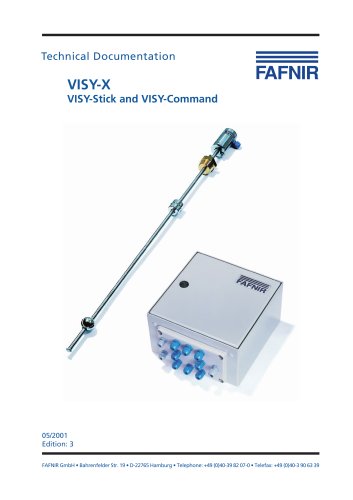 Website:
FAFNIR GmbH
Website:
FAFNIR GmbH
Grupo: Gilbarco Veeder-Root
Excertos do catálogo

Technical Documentation FAFNIR Universal Device Protocol
Abrir o catálogo na página 1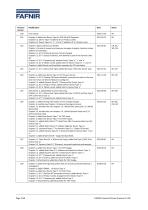
FAFNIR Universal Device Protocol V1.09
Abrir o catálogo na página 2
FAFNIR Universal Device Protocol V1.09
Abrir o catálogo na página 3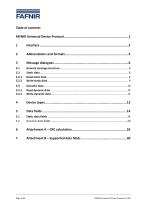
Page 4/30 FAFNIR Universal Device Protocol V1.09
Abrir o catálogo na página 4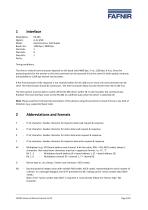
1 Interface Modulation: Signals: Mode: Baud rate: Start-bits: Data-bits: Stop-bits: Parity: Timing conditions: The time to transmit one character depends on the baud rate (4800 bps: 2 ms, 1200 bps: 8 ms). Since the processing time for the answer or the next command can be assumed to be the same for both speeds, timeouts are doubled for 1200 bps and set into brackets. If the first character of the response is not received within 50 ms (100 ms) or more, the next command can be send. The transmission should be continuous. The inter-character delay must be shorter than 20 ms (40 ms). The host...
Abrir o catálogo na página 5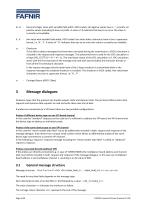
N...N - Decimal integer value with variable field width, ASCII coded, all negative values have a as prefix, all positive values (including 0) have no prefix. A value of -0 indicates that due to an error this value is currently not available. X...X - Hex value with variable field width, ASCII coded. Hex value letter characters have to be in uppercase format, i.e. 'A'...'F'. A value of "-0" indicates that due to an error this value is currently not available. cs - Checksum To be able to detect messages that have been corrupted during the transmission a CRC16 checksum is included in the...
Abrir o catálogo na página 6
FAFNIR Universal Device Protocol V1.09
Abrir o catálogo na página 7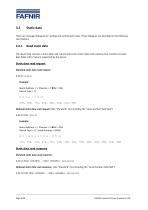
FAFNIR 3.2 Static data There are message dialogues for reading and writing static data. These dialogues are described in the following sub-chapters. 3.2.1 Read static data The device that receives a static data read request will send a static data read response that contains all static data fields (<ID><Value>) supported by the device. Static data read request Standard static data read request: G AC D : cs cs cr Example: Board Address = 1, Channel = 2 ^AC = 01H Device Type = 'a' G 0 1 a : 2 A cr 47H, 30H, 31H, 61H, 3AH, 32H, 41H, 0DH Optional static data read request: (like...
Abrir o catálogo na página 8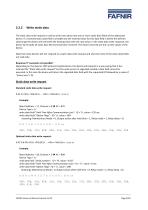
3.2.2 Write static data The static data write request is used to write new values into one or more static data fields of the addressed device. If a received static data field is writable and the received value for this data field is within the defined valid range the device will overwrite the existing value with the new value. In the static data write response, the device will include all static data IDs that have been received. The values returned are the current values of the device. Note that most devices will not respond to a static data write request and also that most of the static...
Abrir o catálogo na página 9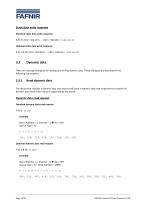
Static data write response Standard static data write response: X AC D <ID1> <VALUE1> ... <IDn> <VALUEn> : cs cs cs cs cr Optional static data write response: X AC D # SN <ID1> <VALUE1> ... <IDn> <VALUEn> : cs cs cs cs cr 3.3 Dynamic data There are message dialogues for reading and writing dynamic data. These dialogues are described in the following sub-chapters. 3.3.1 Read dynamic data The device that receives a dynamic data read request will send a dynamic data read response that contains all dynamic data fields (<ID><Value>) supported by the device. Dynamic data read request Standard...
Abrir o catálogo na página 10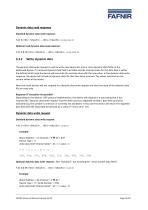
Dynamic data read response Standard dynamic data read response: F AC D <ID1> <VALUE1> ... <IDn> <VALUEn> : cs cs cs cs cr Optional read dynamic data read response: F AC D # SN <ID1> <VALUE1> ... <IDn> <VALUEn> : cs cs cs cs cr 3.3.2 Write dynamic data The dynamic data write request is used to write new values into one or more dynamic data fields of the addressed device. If a received dynamic data field is writable and the received value for this data field is within the defined valid range the device will overwrite the existing value with the new value. In the dynamic data write response,...
Abrir o catálogo na página 11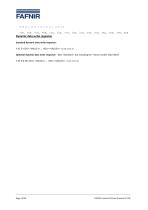
Y 8 A o # 3 7 3 1 c 0 : 4 9 cr 59H, 38H, 41H, 6FH, 23H, 33H, 37H, 33H, 31H, 63H, 30H, 3AH, 34H, 39H, Dynamic data write response Standard dynamic data write response: Y AC D <ID1> <VALUE1> ... <IDn> <VALUEn> : cs cs cs cs cr Optional dynamic data write response: (like "Standard", but including the "serial number data field") Y AC D # SN <ID1> <VALUE1> ... <IDn> <VALUEn> : cs cs cs cs cr FAFNIR Universal Device Protocol V1.09
Abrir o catálogo na página 12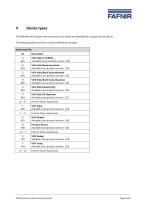
Device types The different device types that the protocol can handle are identified by a unique device type ID. The following table shows the currently defined device types. Device type IDs ID VISY-Stick or TORRIX … Available since protocol version: 1.00 VISY-Stick/Reed Interstitial Available since protocol version: 1.00 VISY-Stick/Reed Sump Manhole Available since protocol version: 1.00 VISY-Stick/Reed Sump Dispenser Available since protocol version: 1.00 VISY-Stick Density Only Available since protocol version: 1.00 VISY-Stick Oil Separator Available since protocol version: 1.01 Free for...
Abrir o catálogo na página 13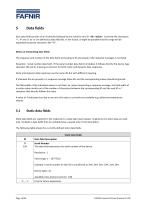
Notes on interpreting data fields: The sequence and number of the data fields (consisting of ID and value) in the response messages is not fixed. Exception: Serial number data field. If the serial number data field is included, it follows directly the device type character (D) and its meaning is common for both, static and dynamic data responses. Static and dynamic data responses use the same IDs but with different meaning. If unknown IDs are present in a response message these IDs and the corresponding values should be ignored. The field width of the individual values is not fixed. So,...
Abrir o catálogo na página 14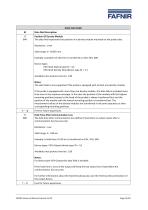
FAFNIR Universal Device Protocol V1.09
Abrir o catálogo na página 15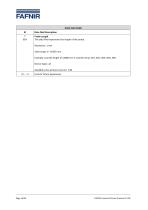
FAFNIR Universal Device Protocol V1.09
Abrir o catálogo na página 16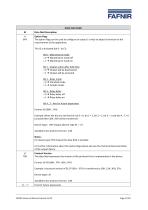
FAFNIR Universal Device Protocol V1.09
Abrir o catálogo na página 17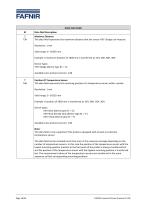
FAFNIR Universal Device Protocol V1.09
Abrir o catálogo na página 18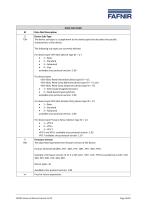
FAFNIR Universal Device Protocol V1.09
Abrir o catálogo na página 19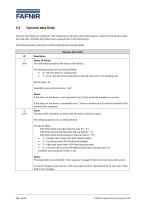
Dynamic data fields are reported in the response to a dynamic data read request. In general, the dynamic data are read-only. Writable data fields have a special note in the description. The following table shows the currently defined dynamic data fields. FAFNIR Universal Device Protocol V1.09
Abrir o catálogo na página 20Todos os catálogos e folhetos técnicos FAFNIR GmbH
-
TORRIX M12 MOBILE
2 Páginas
-
TORRIX XTS
2 Páginas
-
TORRIX 6
1 Páginas
-
LPG Sensors
8 Páginas
-
SEPARIX
8 Páginas
-
Process Automation
28 Páginas
-
O²-PID
4 Páginas
-
COMS Leaflet
4 Páginas
-
VAPORIX Flow and Control
40 Páginas
-
Wallmounting Typ 907
4 Páginas
-
QE 200
4 Páginas
-
UM 2.1/2.2/2.3
20 Páginas
-
TORRIX HART
28 Páginas
-
TORRIX RS485 Modbus
16 Páginas
-
TORRIX M12
40 Páginas
-
FAFNIR Hart Setup
9 Páginas
-
LS 300 / 500
7 Páginas
-
76 A / NB 220
5 Páginas
-
76 / NB 220
2 Páginas
-
SECON-X
4 Páginas
-
PRESSURIX
12 Páginas
-
Insite360
4 Páginas
-
Plugs
12 Páginas
-
UM 2.1/UM 2.2/UM 2.3
20 Páginas
-
TORRIX-HART
28 Páginas
-
DIVELIX
8 Páginas
-
CONDURIX-HART
28 Páginas
-
CONDURIX
24 Páginas
-
VAPORIX
12 Páginas
-
VISY-X
24 Páginas
-
Accessories
3 Páginas
-
VISY-Command Web
4 Páginas
-
VISY-Reed
4 Páginas
-
VISY-RF
2 Páginas
-
VISY-Stick
15 Páginas
-
VISY-TD Display
2 Páginas
-
VISY-View Touch
2 Páginas
-
VPI - VISY-Power Interface
1 Páginas
-
TORRIX
10 Páginas
-
TORRIX CI
1 Páginas
-
TORRIX RS485
3 Páginas
-
UM-X Transducer
3 Páginas
-
TEMPERIX
8 Páginas
-
Overfill Prevention & Accessories
12 Páginas
-
VISY-Input VISY-Output
4 Páginas
-
VISY-Command
5 Páginas
-
LPG-Sensoren
8 Páginas
Catálogos arquivados
-
2019 VISY-Stick Flex
2 Páginas
-
2016 VISY-Stick Flex
2 Páginas
-
HPH Ex d
3 Páginas
-
VISY-Monitor
2 Páginas
-
VISY-X LON
10 Páginas
-
SEPARIX
23 Páginas
-
VAPORIX Flow/Control
32 Páginas
-
VISY-Setup V 3.1.0
40 Páginas
-
VISY-Setup V2.10
42 Páginas
-
VISY-View
24 Páginas
-
VISY-Stick and VISY-Command
24 Páginas
-
Overfill Prevention (GWG)
12 Páginas








